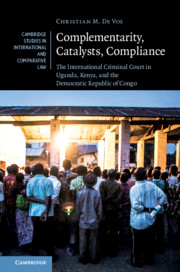 Complementarity, Catalysts, Compliance
Complementarity, Catalysts, Compliance Book contents
- Complementarity, Catalysts, Compliance
- Reviews
- Cambridge Studies in International and Comparative Law: 147
- Complementarity, Catalysts, Compliance
- Copyright page
- Dedication
- Contents
- Acknowledgements
- Table of Cases and Pleadings
- Table of Statutes and Statutory Instruments
- Abbreviations
- Preface
- 1 Introduction
- Part I The ICC and Complementarity: Evolutions, Interpretations and Implementation
- Part II The ICC in Uganda, Kenya and the Democratic Republic of Congo
- Select Bibliography
- Index
- Cambridge Studies in International and Comparative Law: 147
1 - Introduction
Published online by Cambridge University Press: 16 April 2020
- Complementarity, Catalysts, Compliance
- Reviews
- Cambridge Studies in International and Comparative Law: 147
- Complementarity, Catalysts, Compliance
- Copyright page
- Dedication
- Contents
- Acknowledgements
- Table of Cases and Pleadings
- Table of Statutes and Statutory Instruments
- Abbreviations
- Preface
- 1 Introduction
- Part I The ICC and Complementarity: Evolutions, Interpretations and Implementation
- Part II The ICC in Uganda, Kenya and the Democratic Republic of Congo
- Select Bibliography
- Index
- Cambridge Studies in International and Comparative Law: 147
Summary
This introductory chapter frames the overall book, arguing that the ICC’s principle of complementarity has become a transnational site and adaptive strategy for realizing domestic accountability, as well as an array of other governance goals. It argues that complementarity came to be framed as a ‘catalyst for compliance’ through a particular, duty-based reading of the Rome Statute. This reflects the broader dominance of legalism in transitional justice, which insists on the centrality of criminal law in the aftermath of mass atrocity. The first part of the book addresses the evolution, interpretation and implementation of complementarity by state and non-state actors, as well as Court actors (specifically, ICC judges and the Office of the Prosecutor) in The Hague. The second part is empirical: It illustrates the effects of this interpretation and the interaction of the ICC with the normative and institutional accountability frameworks in Uganda, Kenya and the Democratic Republic of Congo. Three aspects are explored in particular: the passage of Rome Statute implementation legislation; the establishment of specialised domestic courts as part of the institutional architecture for prosecuting grave crimes; and the initiation of actual, criminal proceedings that have ensued in the wake of ICC action.
- Type
- Chapter
- Information
- Complementarity, Catalysts, ComplianceThe International Criminal Court in Uganda, Kenya, and the Democratic Republic of Congo, pp. 1 - 24Publisher: Cambridge University PressPrint publication year: 2020
